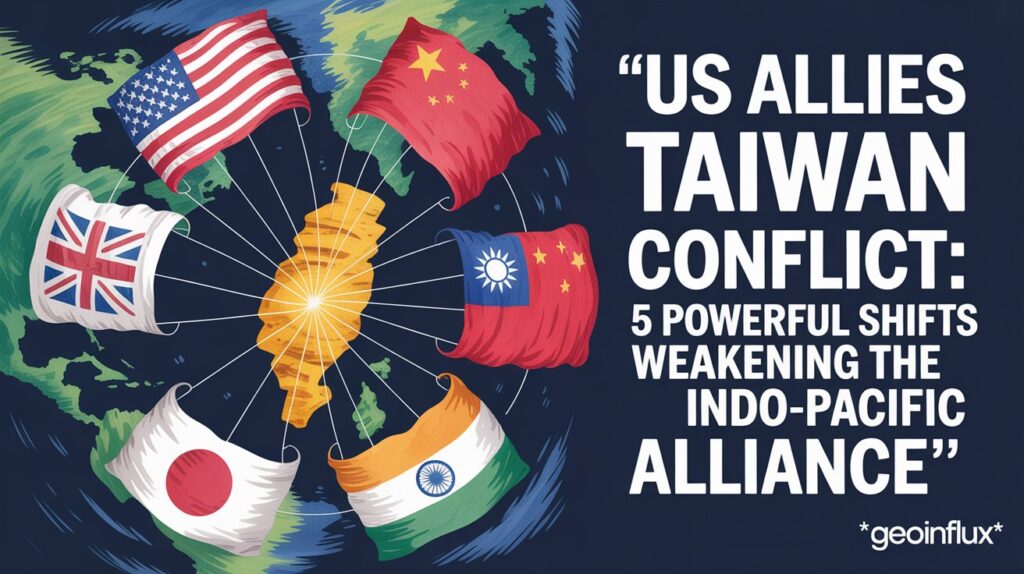US allies Taiwan conflict: Learn how US allies Japan, Australia, and India are recalibrating their Indo-Pacific strategies amid rising tensions over Taiwan. Is the Quad alliance cracking?
Rising tensions in the Indo-Pacific
US allies Taiwan conflict is fast becoming one of the most pressing geopolitical issues in the Indo-Pacific. With tensions rising over Taiwan, the United States is questioning its closest allies—Japan, Australia and India—about their readiness for potential military action against China.
These inquiries have exposed subtle rifts and shifting allegiances within strategic alliances.
Background: US allies face a direct challenge from the Taiwan conflict
The Indo-Pacific region remains tense as Washington presses Japan and Australia to clarify their position on Taiwan under a Trump-esque tough diplomacy.
Concerned about a repeat of the Ukraine-Russia model—where initial inaction led to complications—the US is seeking firm commitment from allies.
Many analysts now argue that a conflict over Taiwan is no longer a question of “if, but when”. What concerns Washington most is the possibility of being left to confront China alone in the unfolding US Allies Taiwan Conflict.
Australia’s Position in the US Allies Taiwan Conflict
Economic priority over military action
Australia’s response, which is being considered the most economically pragmatic, came during Prime Minister Anthony Albanese’s visit to China.
He stressed that China is Australia’s largest export partner, supporting 1 in 4 Australian jobs through sectors such as education and tourism.
“Support Australian businesses, support Australian employment and support our economy,” Albanese declared from Shanghai.
This message, which was released just after the US learned of Australia’s war intentions, sends a clear diplomatic signal: Canberra is not willing to sacrifice economic stability for military adventurism, an important insight into the Taiwan conflict of US allies.
AUKUS tensions and the Trump review
- India-EU Free Trade Agreement 2026 Explained: Why the “Mother of All Deals” Is Reshaping Global Trade and Power
- AI Latest News 2026: January AI News in India and Global AI Trends Explained
- Why Digital Sovereignty Is Now a National Security Issue in 2026?
- Did the US Raid in Caracas Reveal the Real Limits of Chinese JY-27 Radar and Russian S-300 Air Defense?
- How Tech Geopolitics Dramatically Redefined Digital Sovereignty and National Power in 2025?
The situation was further complicated when Donald Trump halted the AUKUS nuclear submarine deal, leading to months of uncertainty.
Australia, which had been hoping to begin construction, was caught off guard. In response, Albanese’s video was seen as a rebuke of US inconsistency.
Why commit to war when AUKUS itself is on shaky ground?
Australia’s public shift toward economic ties with China underscores its changing strategic calculus—security partnerships are only as reliable as their execution in the broader US-allied Taiwan conflict.
Japan’s strategic silence in the US allies Taiwan conflict
The quest for sovereignty: Japan, a key front-line country in the event of Chinese aggression against Taiwan, has maintained strategic silence.
Despite being next in line in the event of Taiwan’s collapse, Tokyo has not explicitly committed to military involvement.

The quest for strategic autonomy
Instead, Japan is reducing its dependence on the US, especially in the defence sector. This shift is driven by anger over Trump’s tariff threat and a broader desire to become a truly independent nation.
Japan remains mindful of the threat from China, but its calculated pause signals an internal rebalancing, seeking national interest more than alliance obligation in the US allies Taiwan Conflict.
India’s position in the US allies Taiwan’s conflict
Strategic ambiguity or strategic neutrality? India’s role in the US allies Taiwan Conflict is multi-layered. Combined with long-standing concerns about US-Pakistan relations, New Delhi’s commitment remains ambiguous.
Although India has stepped up its rhetoric on Tibet and maintained a strong presence in the Quad, it has not signalled naval support for the US-led campaign in the South China Sea.
Should India intervene in Taiwan or stay focused on continental challenges with China?
This strategic ambiguity is deliberate. India is navigating a complex diplomatic landscape, balancing its regional priorities and economic ties, while also projecting its strength against China in the broader context of the US allies Taiwan conflict.
China’s Advantage: Disunity Among Democratic Powers in the US Allies Taiwan Conflict
This emerging schism within the Quad countries is playing directly into Beijing’s hands. A fractured alliance—where Japan is silent, Australia is cautious, and India is restrained—provides China with a potential green signal to act on Taiwan.
“China can take over Taiwan very easily and very quickly,” the sources warn.
If the US finds itself without active support, Trump or any future US president might justify withdrawal:
“What can I do alone, when Japan and Australia are doing nothing?”
This potential abandonment could change the entire course of the US Allies Taiwan conflict.
Strategic Insights: The Changing Status of Global Alliances in the US Allies Taiwan Conflict
The Quad alliance, once a symbol of democratic unity, is now facing internal differences. Economic dependency, political grievances, and historical mistrust are reshaping the Indo-Pacific power equation in the ongoing US Allied Taiwan conflict.
Key insights
- Australia prioritises economic ties with China over alliance obligations.
- Japan seeks autonomy and refuses to blindly follow Washington’s footsteps.
- India maintains a balance while signalling strategic independence.
This realignment raises a serious question: Can the US contain China in Taiwan without the guarantee of allied support?
Summary Table
| Country | Position on Taiwan Conflict | Strategic Focus | Key Concern |
|---|---|---|---|
| Australia | Reluctant to commit; economic priority | Trade with China | AUKUS uncertainty |
| Japan | Silent; seeks strategic autonomy | National sovereignty | Fear of a repeat of Ukraine scenario |
| India | Trade grievances with the US | Border security, Tibet | US-Pakistan history, strategic autonomy |
| USA | Seeks clarity and commitment | Preventing isolation | Fear of a repeat of the Ukraine scenario |
FAQs: US Allies Taiwan Conflict
1. Why did the US question Japan and Australia about a Taiwan conflict? To ensure allied support and avoid isolation in the event of a conflict with China.
2. What was Australia’s response to the US about Taiwan? Australia subtly prioritised economic ties with China, avoiding military commitment.
3. Why is Japan silent on Taiwan? Japan is pursuing strategic autonomy and reassessing its overdependence on the US.
4. What is the AUKUS deal, and how did Trump affect it? AUKUS is a trilateral submarine deal between the US, UK, and Australia. Trump paused its progress, creating doubts in Canberra.
5. Will India support Taiwan militarily? Unlikely in the short term. India is cautious due to its own China border tensions and complex US relations.
6. How does China benefit from this disunity? Lack of unified opposition gives China a potential opening to act decisively on Taiwan.
7. What role does economic interdependence play in Australia’s stance? A major one. One in four Australian jobs relies on trade with China.
8. Why is Trump’s foreign policy relevant to this discussion? His unpredictability, tariff policies, and AUKUS review impact allied trust.
9. Is the Quad alliance breaking? Not officially, but strategic divergence among members is evident.
10. Could this lead to Taiwan being abandoned? If allies do not align, there’s a risk that Taiwan might be left to defend itself.
Related Articles from GeoInflux
- India-China Showdown: Arunachal CM’s Remark Shakes Diplomacy
- India’s Africa Strategy: Economic Expansion or Strategic Depth?
References
🙏 Thank You for Reading
Thank you for taking the time to read our in-depth analysis on the evolving US Allies Taiwan Conflict. At GeoInflux, we are committed to providing timely, strategic insights that help you understand the complex realities of global power shifts. Your continued support motivates us to continue exploring the world’s most important geopolitical developments.
If you found this article useful, feel free to share it, comment, or explore our other insights.
“Together, let’s stay informed and ahead of the times.“





Pingback: Breaking: Israel Syria Airstrikes Reveal 7 Strategic Shifts – Druze Fears, Golan Tensions, and US Ties - GeoInflux
I like what you guys are up too. Such intelligent work and reporting! Carry on the excellent works guys I have incorporated you guys to my blogroll. I think it will improve the value of my website 🙂
I like what you guys are up also. Such clever work and reporting! Keep up the superb works guys I have incorporated you guys to my blogroll. I think it will improve the value of my site 🙂